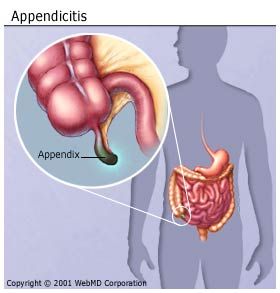Medi Services

Appendicitis is a medical emergency that requires prompt surgery to remove the appendix. Left untreated, an inflamed appendix will eventually burst, or perforate, spilling infectious materials into the abdominal cavity. This can lead to peritonitis, a serious inflammation of the abdominal cavity's lining (the peritoneum) that can be fatal unless it is treated quickly with strong antibiotics.

Sometimes a pus-filled abscess (infection that is walled off from the rest of the body) forms outside the inflamed appendix. Scar tissue then "walls off" the appendix from the rest of the abdomen, preventing infection from spreading. An abscessed appendix is a less urgent situation, but unfortunately, it can't be identified without surgery. For this reason, all cases of appendicitis are treated as emergencies, requiring surgery.
Appendicitis occurs when the appendix becomes blocked, often by stool, a foreign body, or cancer. Blockage may also occur from infection, since the appendix swells in response to any infection in the body.
What Are the Symptoms of Appendicitis?
The classic symptoms of appendicitis include:
Almost half the time, other symptoms of appendicitis appear, including:
If you have any of the mentioned symptoms, seek medical attention immediately, because timely diagnosis and treatment is very important. Do not eat, drink, or use any pain remedies, antacids, laxatives, or heating pads, which can cause an inflamed appendix to rupture.
How Is Appendicitis Diagnosed?
Diagnosing appendicitis can be tricky. Symptoms of appendicitis are frequently vague or extremely similar to other ailments, includinggallbladder problems, bladder orurinary tract infection, Crohn's disease, gastritis, intestinal infection, and ovary problems.
The following tests are usually used to make the diagnosis: